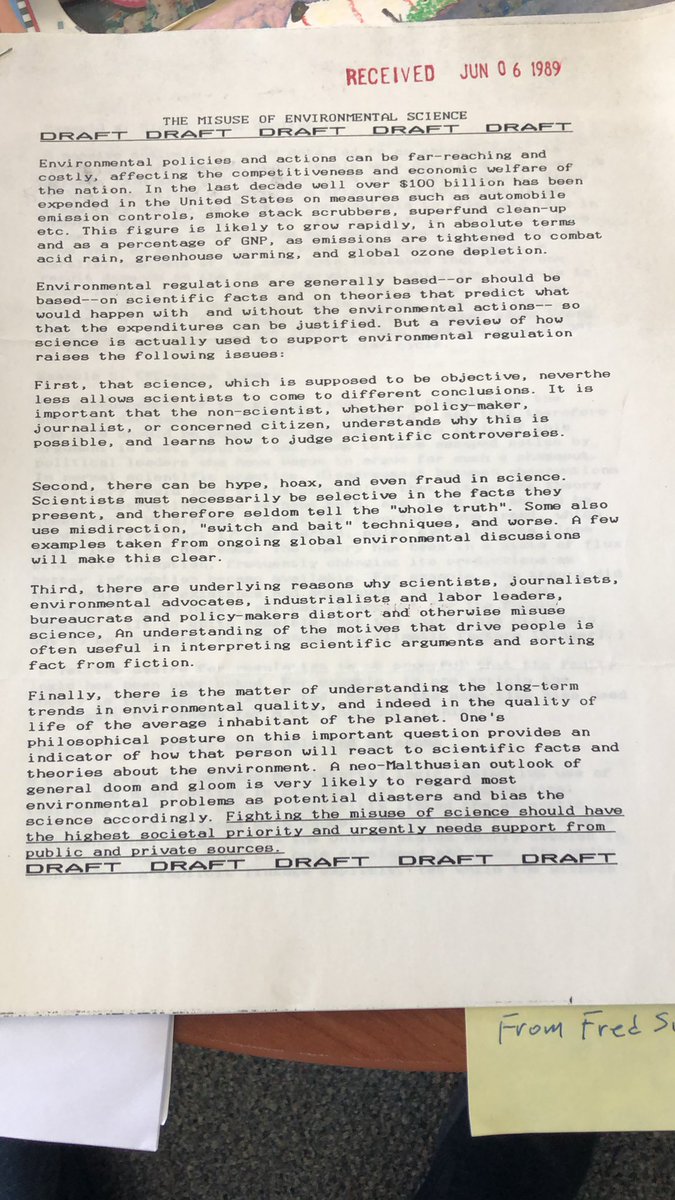
I've been collecting "lessons I've learned communicating climate on Twitter" over the last 8 years and finally thought I'd write a 🧵. This is mainly aimed at younger scientists, but others might find it useful.
First, everyone should tweet about climate. Social change won't happen unless everyone agitates for it.
https://twitter.com/ClimateHuman/status/1315065413500166144?s=20
When you begin outreach, you may feel like you're not enough of an expert. If you're a typical academic, your expertise is a delta function: infinite knowledge about almost nothing.
If we only talked about what we actually research, most of us would have nothing to say.
If we only talked about what we actually research, most of us would have nothing to say.
Luckily, though, you can combine your general knowledge of the climate with an authoritative source of what the experts think on any subject: IPCC reports.
When I communicate, I almost always simply relay what the IPCC says because that's the best summary of what we know.
When I communicate, I almost always simply relay what the IPCC says because that's the best summary of what we know.
For example, I am not a hurricane expert. But I do know enough about the atmosphere that I'm comfortable communicating the IPCC's conclusions.
https://twitter.com/AndrewDessler/status/1431702336095801345?s=20
I think of this as translating the IPCC for the general public. The IPCC is far more accessible than the peer-reviewed literature, but it still is too difficult to read for most of the general public. There is great value in curating the important facts for Twitter.
When you tweet, be authentic. Find your voice and lean into it. I have a somewhat prickly personality — it's who I am.
https://twitter.com/AndrewDessler/status/1067600637427417088?s=20
If you're a scientist, your goal is to be influential. That's why people care so much about citations — it demonstrates their influence.
Twitter provides another way to be influential. A good tweet will get your ideas in front of 100,000x more people than will read your papers.
Twitter provides another way to be influential. A good tweet will get your ideas in front of 100,000x more people than will read your papers.

Twitter can help you be influential in other ways. Over time, a lot of reporters have followed me. If I tweet about something in the news, I'll often get an inquiry from reporters who are interested in my take on the subject.
There's also a strange interest on Twitter for super geeky threads. I was shocked at how many people were interested in a 🧵 on the thermodynamics of air capture. If you see something interesting (and relevant to public dialogue), explain it on twitter.
https://twitter.com/AndrewDessler/status/1160297259294175232?s=20
Perhaps the best thing about Twitter is that I've made a lot of friends. There are people I interact with here that I've never met, but still consider to be friends. I feel that, if we met in real life, we could grab a beer and chat like old friends.
Because Twitter is like a hive mind, you can use it to get the answers to questions. This is much faster than emailing people (and I think less intrusive).
https://twitter.com/AndrewDessler/status/1222208679208017922?s=20
Junior scientists often wonder whether tweeting and having a bigger public profile will be bad for their career. We've all heard the story that Sagan never got into the National Academy because he was too much of a public figure.
I don't know if the Sagan story is true, but I feel that academia now recognizes the value of scientists speaking out (e.g., there are communication awards). I've not heard anyone disparage someone for having a high public profile.
If you do speak out, you have to decide what you are willing to say/advocate for. Some people stick to the science, while others are willing to talk about policy (what we *should* do).
@ClimateOfGavin talks about this in his Schneider lecture:
@ClimateOfGavin talks about this in his Schneider lecture:
Over time, my communications have evolved. There was a time when I stuck to the science, but as climate has become a more urgent problem, I've decided that I should talk more about policy goals.
However, I aspire to make clear when I'm speaking as a scientist (about science) and when I'm speaking as a citizen (about policy). Scientists deserve deference when speaking on their scientific expertise, but not when giving their opinion about policy.
I (almost) never argue climate deniers on Twitter. I didn't go to grad school for 5 years so I could argue with FirstNameBunchaNumbers about whether the greenhouse effect violates the 2nd law of thermodynamics.
You'll never win an argument with someone like that and it's frustrating to try to talk sense into someone who's probably smart but is actively trying to not understand the physics. So don't engage on Twitter unless you think it's a good faith discussion.
Pro tip: Any tweet that starts with "Show me just ONE paper/experiment that proves [your point]" is not a good faith discussion.
So I think Twitter has without question increased my influence. I know a lot more people than I would w/o it and the things I write on twitter get a wider audience than if I were just muttering at my computer screen in my office.
So I encourage any scientist who wants to increase their influence to start tweeting about science & policy. I think it will be good for your career. Also, scientists arguably have an obligation to communicate their science. If you have questions or want advice, DM or email me.
• • •
Missing some Tweet in this thread? You can try to
force a refresh














